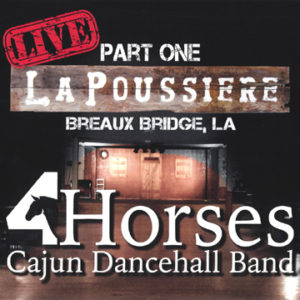4Horses was spawned from Cajun supergroup High Performance when steel guitarist Richard Comeaux had difficulty booking a gig and his usual suspects were unavailable. So, Comeaux and his High Performance bandmates Jamey Bearb and Kevin Dugas, plus a substitute bassist, played the one-off gig as a quartet. Bearb, normally a fiddler, resurrected his first instrument, the accordion, and the experience, says Comeaux, was “magical.” The group opted to continue with High Performance bassist Brazos Huval. During the pandemic, 4Horses became tighter, thanks to regular gigs at Comeaux’s garage attended by friends and neighbors who were spread out across the long driveway.

Just as High Performance’s first two albums were live recordings, 4Horses did the same with its debut. Engineer Scott Ardoin draped the stage with microphones, the band promoted heavily, and from the sound of it, it was a full house. A flock of zealous female fans screams whenever 4Horses kicks off a tune or shifts into an energy-thrusting key modulation. The back story is that although these screams are quite prominent, Ardoin eliminated a considerable amount of crowd noise that was sometimes deafening.
4Horses’ sans-fiddle format opens the door for Comeaux to showcase his extraordinary steel skills. He drones the bass notes, keeps the rhythm jukin’ on the lively ones, and plays riveting, expressive solos on the waltzes and even chimes. On the throttling instrumental “Acadian Two Step,” Comeaux plays increasingly growling slides that keep pace with Bearb’s bustin’ accordion pumping. Though 4Horses gives Comeaux plenty of opportunity to shine, on “Choo Choo Ch’Boogie,” he has the whole pool to himself for a jaw-dropping clinic. His technique is so incredible one has to wonder how all these sounds can emanate from a single instrument. Comeaux differs from other Cajun steelers in that he doesn’t play the more limited open-G tuning but E9, where he has access to every note.
The only song overlapping with High Performance’s recorded output is the rousing “That’s What Makes the Cajuns Dance.” For Bearb, it has deep familial roots. His father, Ricky, co-wrote it with bassist Mac Comeaux and cut it as Ricky Bearb and the Cajun Ramblers Five in 1978. Here, Bearb 2.0 reprises it on the same accordion his father used and plays in his style—different than Steve Riley’s version—with High Performance.
Also similar to High Performance is 4Horses’ reverence for the iconic Belton Richard. Many of these tracks can be attributed to him, either originals or covers culled from his vast repertoire, including “My Last Love,” which makes its recorded debut here. He had written the lyrics on paper but hadn’t finished the melody, so Richard’s widow Brenella asked Bearb if he could complete it. If Bearb had declined, it would have been left undone, as she never intended to offer it to anyone else. Bearb crafted a stirring melody to match the tune’s tenderness, and 4Horses cut it at Travis Matte’s studio for the only studio track of the otherwise live album, with Bearb alternating between accordion and fiddle. This alone is worth the price of admission, but it’s a bargain at any price.




